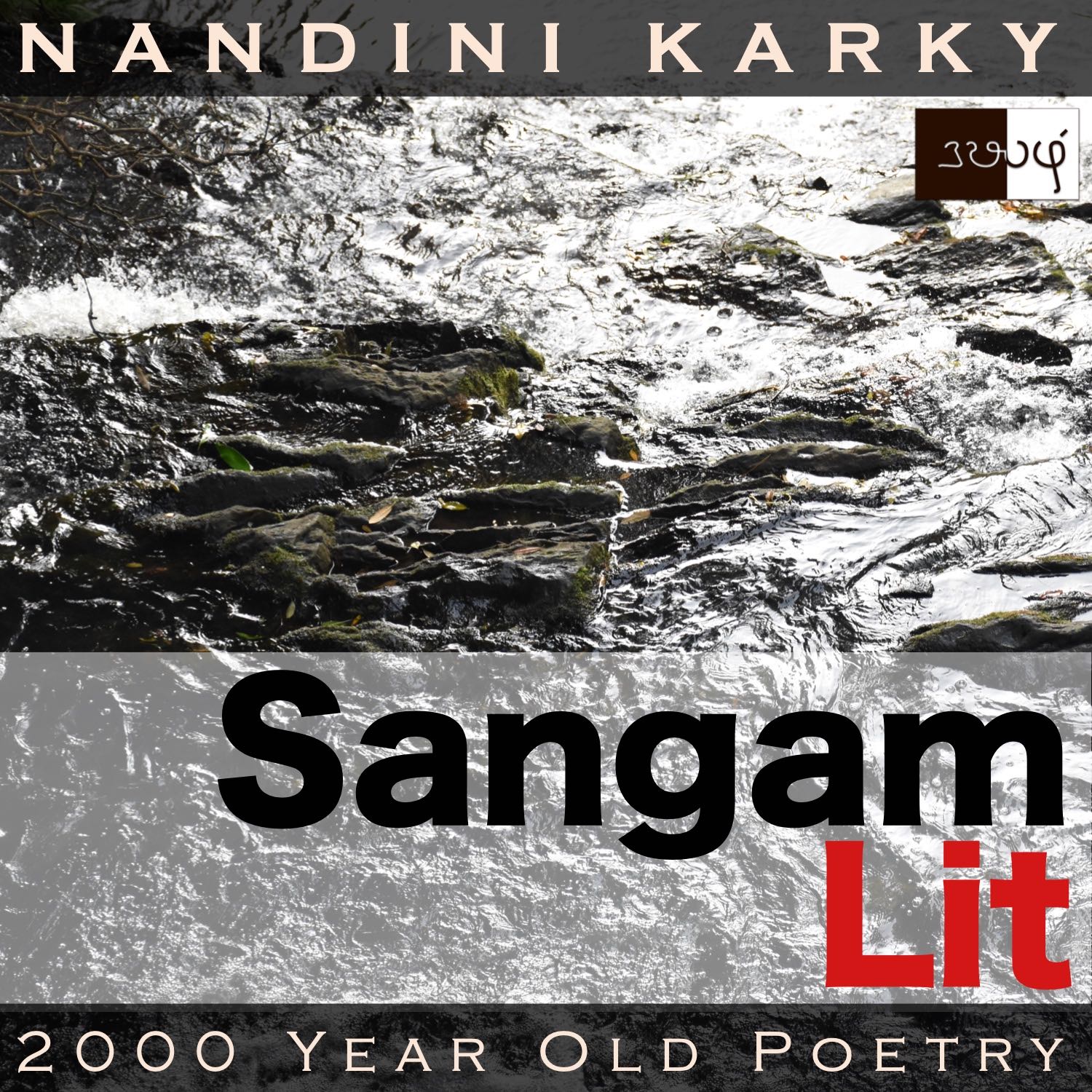Podcast: Play in new window | Download
Subscribe: Apple Podcasts | Spotify | Amazon Music | Android | iHeartRadio | TuneIn | RSS | More

In this episode, we perceive references to faraway ranges and rivers, as portrayed in Sangam Literary work, Natrinai 369, penned by Madurai Olai Kadayathaar Nalvellaiyaar. The verse is situated in the coastal regions of ‘Neythal’ and speaks in the voice of the lady to the confidante, refusing to accept her friend’s words of consolation.
சுடர் சினம் தணிந்து குன்றம் சேர,
நிறை பறைக் குருகினம் விசும்பு உகந்து ஒழுக,
எல்லை பைபயக் கழிப்பி, முல்லை
அரும்பு வாய் அவிழும் பெரும் புன் மாலை
இன்றும் வருவது ஆயின், நன்றும்
அறியேன் வாழி-தோழி!-அறியேன்,
ஞெமை ஓங்கு உயர் வரை இமையத்து உச்சி,
வாஅன் இழிதரும் வயங்கு வெள் அருவிக்
கங்கைஅம் பேர் யாற்றுக் கரை இறந்து இழிதரும்
சிறை அடு கடும் புனல் அன்ன, என்
நிறை அடு காமம் நீந்துமாறே.
Opening with ‘சுடர் சினம் தணிந்து’ meaning ‘the sun’s rage recedes’, the poem personifies the sun’s heat as anger and within that, offers a clue about the time of the day. The second clue comes in the form of ‘குருகினம் விசும்பு உகந்து ஒழுக’ meaning ‘birds soar together on the skies’, bringing forth images of bird flocks returning to their nests. The final clue appears in ‘முல்லை அரும்பு வாய் அவிழும்’, which means, ‘the wild jasmine blooms’ and clearly establishes that the evening is here. The word ‘ஞெமை’ refers to an unidentified tree that apparently grows on the ‘Himalayan peaks’ as can be seen in the words ‘இமையத்து உச்சி’. In addition to this mountain range, we also get to meet a well-known river, Ganges, in ‘கங்கைஅம் பேர் யாற்று’. The phrase ‘சிறை அடு கடும் புனல்’ talks about ‘a fierce flood that breaks dams’. The verse ends with ‘நிறை அடு காமம் நீந்துமாறே’ meaning ‘the path, where my desire breaking shores of shyness, would flow’ and reflects the inherent anguish within.
The man and lady had been leading a love relationship and they had been trysting together for a while. The confidante learns that the lady’s parents have been receiving proposals from strangers and that they were considering to offer their daughter in marriage. So, the confidante reveals the lady’s relationship with the man to her parents. At this time, the man parts with the lady to gather wealth towards their wedding. The lady suffers, missing his company, and when the confidante tries to console her, the lady says, “The sun’s fury diminishes and it reaches the mountains; Birds with full-grown, thick wings soar towards the sky; The day slowly recedes, making the wild jasmine opens its buds. If such a suffering-filled evening were to appear today too, I know not what to do. May you live long, my friend! From the peaks of the Himalayas, where tall trees abound, resounding to the skies, descend white cascades, which fall into the Ganges, making it overflow its banks and flow as a fierce flood, breaching the dams. Akin to this flood, my desire breaches the shores of my shyness and I know not the path it would take!” With these words, the lady expresses her inability to bear with the man’s parting as the evening hour torments her.
Now, for the nuances! The lady describes the ways in which the evening shows its presence. First, the sun’s fury seemed to ebb as it moved towards the mountains, which tell us that the setting of the song is on the eastern shores of Tamilnadu. A familiar sight of birds flying in huge numbers that unfolds in the evening, to anyone who glances up at the skies, is mentioned here. The last image is that of the beautiful blooming of wild jasmine flowers during dusk. These are pleasant sights to a happy heart. But, to the lady, these are the very elements of torture! The lady says that she knows not how she can bear with another evening, filled with these elements. From the coastal shores, the lady then whisks us away to the Himalayan peaks, where ‘Nemai’ trees are said to grow. This tree has not been named by scholars, but considering it’s the Himalayas, it could refer to the ‘High altitude fir’ or the ‘Himalayan yew’ that is said to grow as high as 3500 metres. Returning to the verse, we find that the lady has taken us to the tree-dense Himalayan peaks, only to point out the white cascades that roar down and end in the mighty Ganges, making the river breach its banks and flood the land. This entire scene is mentioned by the lady as a parallel to her own intense feelings of passion and how it seems to overflow the boundaries of her shyness. The lady ends by saying she knows not how she would overcome this uncontrollable flood of emotions in her heart and how she would swim across to safe shores!
The striking element in the verse is the mention of the Himalayan peaks and the Ganges. This reminds me of how song sequences in Indian movies are frequently shot in foreign locales. The protagonists, who were walking and talking on the streets of Indian cities, are suddenly swaying and crooning in Switzerland or Peru. Likewise, this ancient poet seems to have taken his audience to the Himalayan peaks. Did this poet actually travel to those regions or could these have risen out of shared conversations with poets and scholars from the North? Fascinating to think how faraway places seemed to be common knowledge to find a mention in this poem from ancient Tamil land. Turning our attention to the lady’s precarious situation, we find that although the lady says she knows not the way to overcome, the outlet is no doubt, that very expression of emotions!




Share your thoughts...